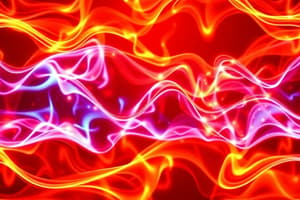Podcast
Questions and Answers
Who was the physicist that believed engine efficiency was the key that could help France win the Napoleonic Wars?
Who was the physicist that believed engine efficiency was the key that could help France win the Napoleonic Wars?
- Maxwell Planck
- Lord Kelvin
- Sadi Carnot (correct)
- James Joule
Which branch of physics deals with heat, work, temperature, energy, entropy, and the physical properties of matter and radiation?
Which branch of physics deals with heat, work, temperature, energy, entropy, and the physical properties of matter and radiation?
- Quantum mechanics
- Thermodynamics (correct)
- Electromagnetism
- Astrophysics
Who was the first physicist to formulate a concise theory of thermodynamics?
Who was the first physicist to formulate a concise theory of thermodynamics?
- Maxwell Planck
- Lord Kelvin (correct)
- James Joule
- Sadi Carnot
Which field does thermodynamics NOT apply to?
Which field does thermodynamics NOT apply to?
What provides a quantitative description of the behavior of heat, work, and temperature in thermodynamics?
What provides a quantitative description of the behavior of heat, work, and temperature in thermodynamics?
Flashcards
Who was Sadi Carnot?
Who was Sadi Carnot?
Sadi Carnot was a physicist who believed engine efficiency was key to France winning the Napoleonic Wars.
What is Thermodynamics?
What is Thermodynamics?
Thermodynamics is the branch of physics dealing with heat, work, temperature, energy, entropy, and matter/radiation properties.
Who was Lord Kelvin?
Who was Lord Kelvin?
Lord Kelvin was the first physicist to formulate a concise theory of thermodynamics.
Thermodynamics applications
Thermodynamics applications
Signup and view all the flashcards
Laws of Thermodynamics
Laws of Thermodynamics
Signup and view all the flashcards
Study Notes
Historical Context of Thermodynamics
- Sadi Carnot, a French physicist, believed that improving engine efficiency was crucial for France to win the Napoleonic Wars.
Branch of Physics
- Thermodynamics is the branch of physics that deals with heat, work, temperature, energy, entropy, and the physical properties of matter and radiation.
Formulation of Thermodynamics
- Sadi Carnot was the first physicist to formulate a concise theory of thermodynamics.
Limitations of Thermodynamics
- Thermodynamics does not apply to biological systems.
Fundamental Principle of Thermodynamics
- The laws of thermodynamics provide a quantitative description of the behavior of heat, work, and temperature in thermodynamics.
Studying That Suits You
Use AI to generate personalized quizzes and flashcards to suit your learning preferences.



